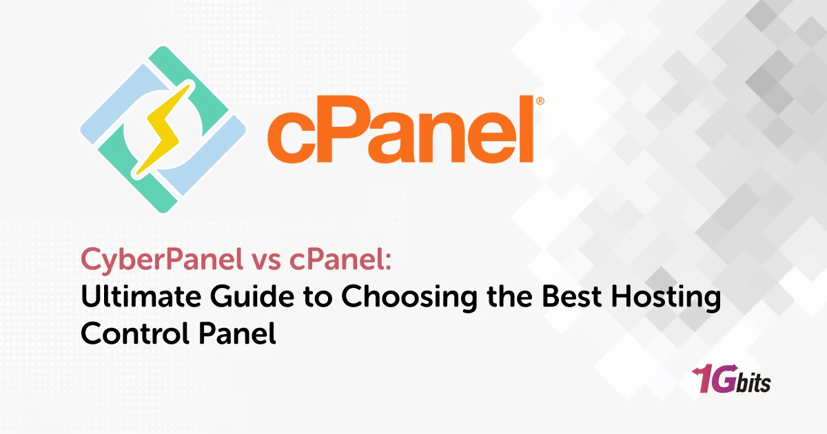Choosing the best control panel for hosting is one of the most important decisions for developers, resellers, agencies, and business owners. The control panel determines how efficiently you manage websites, how fast your server performs, how secure your environment is, and ultimately how smoothly your hosting business runs.
With cPanel dominating the industry for more than two decades and CyberPanel emerging as a modern open-source competitor built around LiteSpeed, the question becomes: Which one actually fits your needs?
This comprehensive guide helps you compare web hosting panels from every essential angle features, UI, performance, pricing, security, developer tools, and real-world use cases.
Before we go further, if you want to explore other options as well, you can also refer to our guide on 10 cPanel alternatives a helpful resource if you are evaluating multiple hosting dashboards.
Introduction to CyberPanel and cPanel
What is cPanel?
cPanel is the most established hosting control panel in the world. Known for its stability, long-term reliability, and massive third-party ecosystem, it’s widely used by hosting providers, agencies, and enterprise environments. It provides a traditional Linux hosting dashboard running primarily on Apache (with the option to integrate NGINX or LiteSpeed Enterprise as additional layers).
What is CyberPanel?
CyberPanel is a newer but rapidly growing hosting panel powered by OpenLiteSpeed, known for extremely fast PHP performance, low RAM usage, and modern UI components. It’s open source, free for basic use, and offers features such as LSCache, Docker integration, Git management, one-click staging, and highly optimized WordPress hosting out of the box.
If you're considering dedicated hosting based on CyberPanel, check our CyberPanel VPS solutions to deploy optimized LiteSpeed environments instantly.
Quick Comparison Table
The following table provides a concise overview before we dive into deeper analysis. This is meant to give you a clear starting point in the CyberPanel vs cPanel comparison and help you quickly compare web hosting panels based on key parameters.
|
Feature |
CyberPanel |
cPanel |
|
User Interface |
Modern, clean, simplified |
Traditional but very familiar |
|
Performance |
Built on OpenLiteSpeed → very fast, low RAM |
Apache-based by default → heavier load |
|
Pricing |
Free version available |
Paid, per-account licensing |
|
WordPress Optimization |
Native LSCache, staging built-in |
Requires plugins or LiteSpeed Enterprise |
|
Security Tools |
FirewallD, ModSecurity, CSF integration |
Strong built-in security suite |
|
Developer Tools |
Git manager, Docker, terminal |
Git, SSH, cron, advanced DNS |
|
Ease of Use |
Great for beginners |
Industry standard for hosting providers |
|
Support |
Community + paid |
Mature enterprise-grade support |
Now let’s break down each area in detail so you can see who wins in each category.
Feature-by-Feature Comparison
User Interface & Ease of Use
One of the first things most users notice in the CyberPanel vs cPanel discussion is UI experience. CyberPanel offers a modern, uncluttered layout designed with simplicity in mind. The dashboard loads quickly, icons are straightforward, and essential tools like WordPress installation or SSL setup are placed prominently.
cPanel, on the other hand, uses a more traditional grid-based interface. It’s not necessarily “old,” but it feels familiar rather than modern. Its strength lies in consistency: the layout has hardly changed in years, so experienced users and hosting companies prefer it simply because everyone already knows how it works.
Verdict:
CyberPanel is visually more modern and easier for beginners, while cPanel wins for familiarity in professional environments.
Performance & Resource Usage
If you want to compare web hosting panels based on speed and server efficiency, the difference is significant.
CyberPanel performance benefits greatly from the OpenLiteSpeed web server. This includes:
-
Faster PHP execution
-
Built-in caching (LSCache)
-
Lower CPU load under high traffic
-
Better TTFB and static file delivery
This makes CyberPanel especially attractive for WordPress-based hosting and high-traffic websites.
cPanel, being traditionally tied to Apache, consumes more RAM and CPU. To match LiteSpeed-level speed, you must purchase LiteSpeed Enterprise, which increases the hosting bill even more.
Verdict:
CyberPanel delivers better raw performance at a lower cost, especially for PHP applications.
Security Features
CyberPanel offers FirewallD support, ModSecurity rules, CSF compatibility, and built-in fail2ban-like login protection. SSL can be deployed instantly with Let’s Encrypt, and automatic renewals are handled smoothly.
cPanel includes strong and mature security tooling out of the box. Its combination of ModSecurity, Imunify360 (optional), two-factor authentication, host access control, directory protection, and advanced file integrity monitoring is trusted by enterprise-level hosting providers.
Verdict:
cPanel wins for mature, enterprise-grade security. CyberPanel is strong but less battle-tested.
WordPress & CMS Support
This is one of the most decisive points in the cPanel vs CyberPanel for WordPress discussion.
CyberPanel was built with WordPress in mind. OpenLiteSpeed combined with LSCache delivers exceptional optimization without installing heavy plugins. You also get one-click staging, cloning, backup tools, and auto-installer functionality.
cPanel supports WordPress well, but performance depends heavily on the server stack you configure. Without LiteSpeed, it relies on Apache + caching plugins, which is slower and requires more manual tuning.
If you're specifically looking for optimized WordPress hosting, consider our cPanel VPS solutions if you want enterprise stability — or CyberPanel VPS for LiteSpeed performance.
Verdict:
CyberPanel delivers superior out-of-the-box WordPress performance.
Backup & Restore Options
CyberPanel includes incremental backups, remote backups via SFTP/Google Drive, and quick restore functionality. It’s simple and lightweight but lacks the deep automation of more mature systems.
cPanel offers full account backups, configuration backups, and automated scheduled backups, and it works reliably with large hosting environments that manage thousands of accounts.
Verdict:
CyberPanel is easier for small setups; cPanel is more robust for large hosting operations.
Developer Tools (SSH, Git, Docker, Terminal)
CyberPanel integrates Git deployment, Docker management, terminal access, and Python app deployment directly in the UI. This makes it appealing to developers who want modern tooling without third-party integrations.
cPanel has SSH, Git, cron, and terminal support, but Docker is not native. Developers who need containerized workloads may find CyberPanel more attractive.
Verdict:
CyberPanel is more modern for developers; cPanel is more traditional but very stable.
Pricing Comparison
Pricing is one of the biggest deciding factors in the CyberPanel vs cPanel debate. Not just because users want something affordable, but because the licensing model of cPanel changed significantly over the years — especially after it switched to a per-account billing structure. This pushed many users to look for cPanel alternatives, which is why CyberPanel gained so much popularity.
Let’s break down the pricing of each solution.
CyberPanel Pricing Plans
CyberPanel offers two main pathways:
1. CyberPanel Free (Open-Source Version)
This version is genuinely free and includes:
-
OpenLiteSpeed web server
-
LSCache
-
Auto SSL
-
Git manager
-
WordPress installer
-
Docker manager
-
Email management
-
DNS & security tools
For freelancers, small businesses, and developers managing a few websites, the free version is more than enough and gives you high-quality CyberPanel performance without licensing costs.
2. CyberPanel Enterprise (LiteSpeed Enterprise Integration)
The paid version uses LiteSpeed Enterprise instead of OpenLiteSpeed, offering enterprise-level features such as ESI caching, QUIC.cloud premium support, higher performance tuning, and advanced page caching. Pricing scales with the number of domains.
cPanel Pricing Tiers
cPanel is known for providing stability, massive support, and a dependable ecosystem, but it’s also one of the most expensive hosting panels on the market. Its pricing model is based on:
-
Solo License – 1 account
-
Admin – Up to 5 accounts
-
Pro – Up to 30 accounts
-
Premier – Up to 100+ accounts (scaled per-account cost)
For hosting companies, agencies, and server administrators managing dozens or hundreds of accounts, these costs can grow rapidly making many explore 10 cPanel alternatives such as CyberPanel, DirectAdmin, and Plesk.
If you want enterprise-grade performance backed by the familiarity of cPanel, explore our cPanel VPS solutions to deploy instantly without worrying about system configuration.
Verdict:
CyberPanel wins for affordability. cPanel wins for enterprise-grade reliability but comes with a higher cost.
CyberPanel vs cPanel for WordPress Hosting
WordPress is the world’s most widely used CMS, so it’s no surprise that hosting panels are often evaluated on how well they handle it. Many users specifically search for:
-
CyberPanel vs cPanel for WordPress
-
best control panel for hosting WordPress
-
compare web hosting panels for CMS performance
CyberPanel is widely acknowledged as one of the fastest stacks for WordPress because OpenLiteSpeed + LSCache significantly boosts TTFB, dynamic page rendering, and concurrent handling under load.
Why CyberPanel is Better for WordPress
-
LSCache outperforms virtually all PHP-based caching plugins
-
One-click staging and cloning
-
HTTP/3 and QUIC support
-
Faster PHP handling
-
Lower RAM usage under traffic spikes
In short: CyberPanel is built for speed, especially for PHP-based websites.
Why cPanel is Still Preferred by Many WordPress Users
-
Massively familiar
-
Works with any hosting provider
-
Supports LiteSpeed Enterprise (paid)
-
Offers Softaculous + extensive backup options
-
Strong security hardening
If you integrate LiteSpeed Enterprise on cPanel, performance becomes comparable to CyberPanel — but this requires additional licensing costs.
Verdict:
CyberPanel provides faster, more optimized WordPress hosting out-of-the-box.
cPanel provides convenience, familiarity, and stability with additional cost.
Which One Is Better For You? (Use-Case Recommendations)
Let’s move away from the technical details and look at real-world applications. The choice between CyberPanel vs cPanel becomes much easier when you evaluate your specific use case.
For Beginners
If you’re just starting with VPS management or running a small website, CyberPanel is typically the better choice. It’s:
-
Easy to navigate
-
Clean and modern
-
Offers a free version
-
Requires fewer resources
Users new to hosting often find cPanel intimidating because it contains more tools than they need.
Best choice: CyberPanel
For Freelance Developers
Freelancers often work with multiple client sites and need quick staging creation, fast WordPress environments, and efficient tools like Git or Docker.
CyberPanel offers these features natively, but cPanel provides broader compatibility with older or non-PHP systems.
Best choice: CyberPanel for modern stacks, cPanel for compatibility-focused environments.
For Agencies or Hosting Resellers
Agencies managing many accounts tend to prefer cPanel because of:
-
Account isolation
-
WHM integration
-
Professional support
-
Compatibility with thousands of hosting companies
cPanel was built for multi-account environments, whereas CyberPanel is better suited for individuals, developers, or small teams.
If you run an agency and need to evaluate multiple solutions, consider reading our deep comparison guide on Plesk vs cPanel for broader perspective.
Best choice: cPanel
For VPS Hosting Scenarios
In VPS environments, resource usage matters. The difference between OpenLiteSpeed and Apache becomes very noticeable if RAM is limited.
CyberPanel is excellent for:
-
Small VPS plans (1–4 GB RAM)
-
High-performance WordPress VPS setups
-
Developers needing modern tools
cPanel is excellent for:
-
Large VPS plans
-
Multi-user environments
-
Enterprise-grade deployments
If you're specifically seeking high-speed LiteSpeed-based hosting, we recommend exploring our CyberPanel VPS options optimized for better stability, speed, and LSCache integration.
Real User Experiences & Testimonials
Understanding the practical, real-world experiences helps you compare web hosting panels in a more human way. Based on feedback from developers and hosting communities:
CyberPanel Users Say:
-
“The speed is unbelievable compared to Apache.”
-
“Free version is powerful enough for most projects.”
-
“Some updates can be buggy, but features evolve fast.”
-
“Perfect for WordPress hosting.”
cPanel Users Say:
-
“It’s stable and works the same everywhere.”
-
“Every hosting provider supports it — zero learning curve.”
-
“The licensing model is expensive, but worth it for business.”
-
“Best documentation and support in the industry.”
This aligns with broader industry sentiment: CyberPanel is preferred for performance and modern workflows, while cPanel leads in stability and support.
Conclusion: Summary of Pros and Cons
CyberPanel Advantages
-
Free open-source version
-
Fastest WordPress stack with LiteSpeed
-
Modern design and developer tools
-
Lightweight and perfect for VPS hosting
-
Great choice for users seeking cPanel alternatives
CyberPanel Disadvantages
-
Less mature than cPanel
-
Occasional bugs
-
Not ideal for large-scale reseller hosting
cPanel Advantages
-
Industry standard with long-term support
-
Mature ecosystem with excellent documentation
-
Works well for agencies and hosting providers
-
Highly reliable, stable, and secure
cPanel Disadvantages
-
Higher licensing costs
-
Heavier resource usage
-
Requires tuning for top-tier performance
Final Verdict
If your priority is speed, modern features, and cost-efficiency, CyberPanel is the winner especially for WordPress hosting and developers wanting a lightweight, high-performance stack.
If your priority is stability, large-scale user management, and enterprise-level support, cPanel remains the best control panel for hosting in professional environments.
No single panel is better for everyone but there is a clear winner for each type of user.








